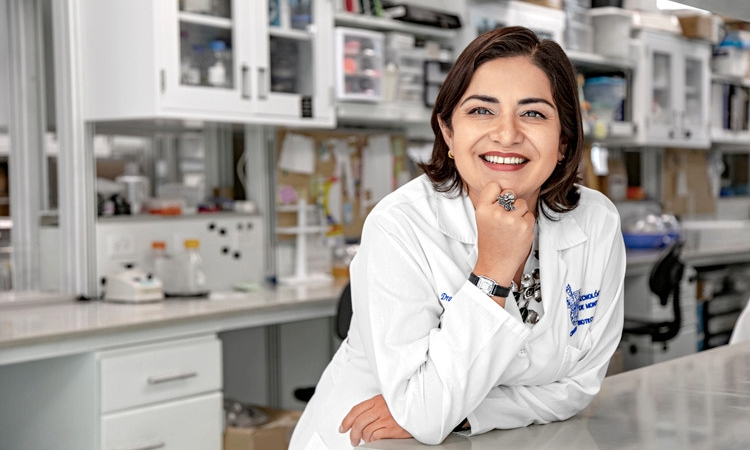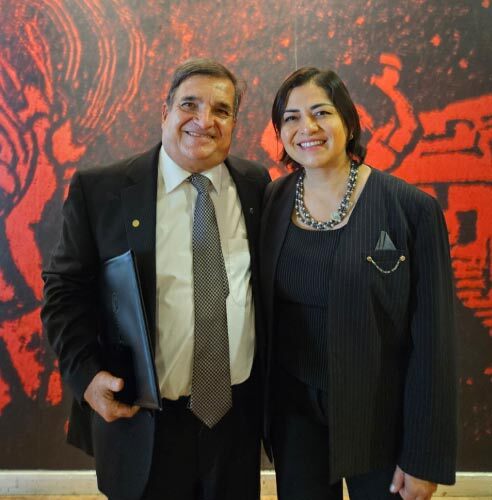Janet Gutiérrez: Food Research Can Transform Health and Entrepreneurship

Sponsored by

Sponsored by

The associate dean for Faculty Development at the School of Engineering and Sciences at Tec has researched the active properties of Mexican foods like black beans and nopal, as well as their benefits against chronic diseases such as cancer.
https://tecscience.tec.mx/en/human-social/janet-gutierrez-food-research/
Ricardo Treviño
October 8, 2024
For Janet Gutiérrez, research is a passion; as soon as she steps into the lab, she feels right at home. Upon reaching the fifth floor of the FEMSA Biotechnology Center, she sheds her coat and puts on her lab coat.
In this cutting-edge facility, she has conducted numerous studies in phytochemistry and nutritional biochemistry, building a career that spans over 20 years, marked by innovation and health-related discoveries. Additionally, she has nurtured new talents eager to make an impact in the food industry.
Since the beginning of this year, she has taken on the role of associate dean for Faculty Development at the School of Engineering and Sciences at Tec de Monterrey. In this capacity, she supports faculty members on matters of intellectual vitality and educational innovation. While she acknowledges that her time in the lab has diminished, she remains committed to conducting research aimed at finding compounds to combat chronic degenerative diseases and supporting scientific and technological based ventures that address societal needs.
Passion for Food
Janet has discovered and validated active compounds from various vegetables, including black beans, agave, nopal, and corn. Although she grew up in Monterrey, her family roots took her to villages in Morelos, Jalisco, Oaxaca, and Guanajuato, where she experienced traditional customs and foods.
How did your passion for food begin?
My maternal grandfather worked in agriculture and owned a butcher shop. Every weekend, I would help my grandmother make chorizo, cheeses and everything related to pork; that’s where I learned to make the most of every part. My paternal grandmother was from a village in Morelos and was knowledgeable about medicinal plants. With my aunt, who worked in rural education, I visited many communities where there’s a direct connection to food production. I learned a lot about this topic, which is now part of my research.
So you decided to pursue a degree in Food Industry Engineering…
I chose that field because, among all the options, it seemed to offer the quickest path to entrepreneurship—something I was always interested in since I enjoyed dealing with customers and selling products. I did that at my grandfather’s butcher shop and at my aunts’ restaurant.
What do you consider the biggest challenge for the food industry?
As Mexicans, the first priority is that it has to taste good, look appealing, and contain health-beneficial ingredients. We need to consider ingredients that can be integrated into the industry without raising costs. This is a significant challenge in our country: there are people with low incomes who need a source of calories and don’t pay much attention to labels or certifications. If that weren’t the case, we would have already addressed the issue of childhood obesity. There is a lack of food alternatives that are both delicious and affordable for families.

For her work as a food researcher, Janet Gutiérrez has received awards such as the Research Award from the Mexican Academy of Sciences in 2020 and the INSIGNIA distinction from the Rómulo Garza Award in 2021. (Photo: Alejandro Salazar | TecScience)
The Bioactive Richness of Mexican Food
During her master’s and Ph.D. studies in Biotechnology, Janet was part of the NutriOmics research team led by Sergio Serna. Much of her time was spent in the biotherium at the School of Medicine, validating the active compounds in Mexican foods and their health benefits. Her work with animal trials led to tumor reductions of up to 40%, and her research on black beans as a potential treatment for colon cancer earned her an award from the Mexican Association of Gastroenterology in 2017.
Food and health—how did you choose that path in your research?
My dad is a gastroenterologist, and one day, halfway through my degree, as I began to grasp everything happening with the molecules in food, I told him I might have preferred studying medicine. He replied, “No, what you want to understand is how food impacts health.”
That’s when I realized that food research is a multidisciplinary field, involving collaboration between doctors, economists, financial experts, and other professionals. I understood that this is what I wanted to pursue.
You’ve studied the properties of black beans, nopal, corn, and agave—are they really that beneficial?
During my master’s program, I realized that 100 years ago, obesity wasn’t the problem it is today. Mexican food, by nature, is not obesity-inducing; I thought we have a tremendous source of nutrients and active compounds in our foods that we haven’t fully exploited.
Sometimes we view foods only through the lens of macronutrients, which are large molecules present in high quantities, like carbohydrates. But the reality is that there are compounds present in very low concentrations that interact with our genes and can be responsible for anti-inflammatory effects. For example, flavonoids in nopal are molecules that can persist for a long time and interact effectively with our bodies.
And regarding cancer…
When I was studying for my master’s, I had an aunt who suffered from cancer, and the first thing they did was restrict her diet. I thought, “It can’t be posible that someone with cancer can’t eat almost anything because we don’t understand the interactions with their medications; maybe some foods could actually be beneficial.” That motivated me to work on cancer and black beans. I was determined to identify active compounds; it was already known that soy had anti-cancer properties.
I thought, “There must be a similar molecule in black beans,” and I dedicated my master’s and Ph.D. to isolating and validating those molecules. I can’t say it will cure cancer, but what we’ve observed with those consuming our products is that they do reduce chronic inflammation, which is one of the first stages in damaging cells. Seeing that it’s working is incredibly satisfying.

Janet’s interest in food began with her family when she helped her maternal grandparents (left) in the town of Buenavista, in the municipality of San Martín Hidalgo, Jalisco, where they owned a butcher shop. For her, family—from her grandparents to her children—has been a cornerstone of her career. (Photo: Courtesy.)
From the Lab to Entrepreneurship
Janet has successfully developed nearly 20 patents; her first was the key to launching her own venture: Jaseda, which was established in 2022. This patent focused on isolating active compounds from foods for preventive and therapeutic purposes in cancer development. Concurrently, she validated anti-inflammatory mechanisms related to the prevention and treatment of cirrhosis and liver inflammation.
What was it like transitioning from lab research to entrepreneurship?
I always wanted to do it. One of the most valuable experiences at Tec has been building relationships with the industry and seeing how research can solve problems in that sector. We worked extensively on a project for which a patent was to be transferred to a pharmaceutical company, but ultimately, that didn’t happen. Then, an opportunity arose to train in technology-based startups. We realized that what we had patented required significant investment, learned what a minimum viable product (MVP) meant, and developed our own. We also learned to detach ourselves from our creation and to seek ways for our innovation or patent to provide value to the industry or to a market willing to pay for it. Our first patent was the Wellbean supplement, capsules containing standardized black bean extract.

Janet considers Sergio Serna her professional and life mentor, with whom she has been able to work on research and start ventures based on his work in the laboratory. (Photo: Courtesy.)
A Legacy in Research, Entrepreneurship, and Leadership
Janet Gutiérrez has published over 120 scientific articles, garnering more than 3,000 citations. She received the Research Award from the Mexican Academy of Sciences in 2020 and the INSIGNIA distinction from the Rómulo Garza Award in 2021. Additionally, she is a founding member of Alfanutra, a nutraceutical association in Mexico, and a member of the World Economic Forum’s Community of Young Scientists. At Tec, she has been a leader in the Healthy Foods unit of the Institute for Obesity Research and served as the director of the Department of Biotechnology and Sciences in the Southern Region.
Who inspired you in your research journey?
Dr. Sergio Serna. My research career started with him, and doing the math, I’ve spent more than half my life working alongside him. He’s a researcher who opened my eyes to discoveries while also connecting them to industry. Enrique Galindo from UNAM also served as a role model for identifying needs, finding commercial partners, and producing at scale. He’s been inspiring in demonstrating how technology-based entrepreneurship can thrive.
As a mentor, how do you feel when you see a researcher succeed in entrepreneurship?
It shows that it is possible—that you can change your mindset and leave a mark on others who are contributing to society. I’m someone who loves Mexico, and when I see these young people, I think, “They’re going to transform what we have today.” I want to leave a legacy that shows things can improve through the transformation of industry.
As a female researcher and leader, what challenges do you see?
In my fields of food science and technology, and bioengineering, I do see equity. However, as associate dean for Faculty Development, I’m concerned about the low number of women in the School of Engineering and Sciences. Additionally, during my time as director of the Department of Sciences, I noticed the fear some women have about taking on leadership roles while managing family responsibilities. I aim to demonstrate that it is indeed possible to reach leadership positions while being a mother and pursuing your passions.
Regarding your legacy, what do you feel is still left to accomplish?
I believe I’ve already established a legacy in research: being one of the first Mexican researchers to identify active compounds in foods. I measure this by the number of citations and the global interest I’ve sparked, particularly regarding nopal. When I receive citations from Africa, Spain, and other regions, it shows that interest in researching these foods extends beyond Mexico. I want to contribute to an environment that promotes technology-based entrepreneurship. With Jaseda, we’ve already launched a venture; now, the goal is to transform it into a company that generates substantial value and jobs, creating a greater impact on society.
Are you interested in science? TecScience, a new way to communicate scientific research. Visit: https://tecscience.tec.mx/en/